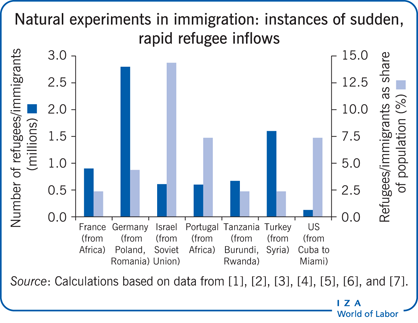Elevator pitch
Estimating the causal effect of immigration on the labor market outcomes of native workers has been a major concern in the literature. Because immigrants decide whether and where to migrate, immigrant populations generally consist of individuals with characteristics that differ from those of a randomly selected sample. One solution is to focus on events such as civil wars and natural catastrophes that generate rapid and unexpected flows of refugees into a country unrelated to their personal characteristics, location, and employment preferences. These “natural experiments” yield estimates that find small negative effects on native workers’ employment but not on wages.

Key findings
Pros
Refugee flows into a country are generally due to reasons unrelated to the immigrants’ location and employment preferences.
Refugee flows bring in a massive number of immigrants within a short period.
The location of refugees within the host country is generally determined by the host government based on security, logistic, and social concerns.
From the host country perspective, refugee flows are mostly unexpected events that can be considered immigration shocks.
Cons
Refugee inflows to a region can trigger an outflow of native workers from the refugee-receiving regions to other regions in the host country, creating new selectivity problems.
The skill composition of refugees may affect their impact on native workers’ labor market outcomes.
The impact of refugees may also depend on the existing stock of immigrants, which affects the absorption capacity of local labor markets.
In the longer term, the occupational distribution of the refugee population may be influenced by the relative returns across occupations in the host labor market.